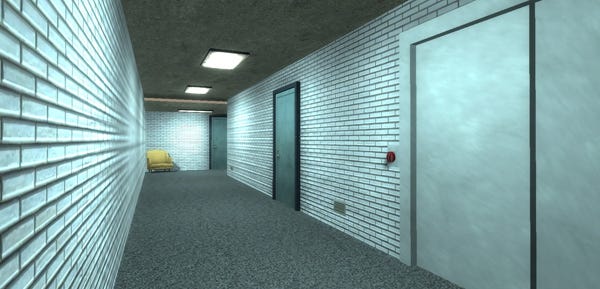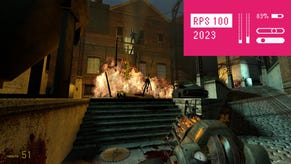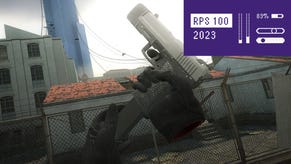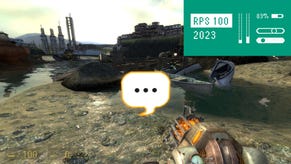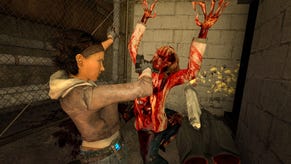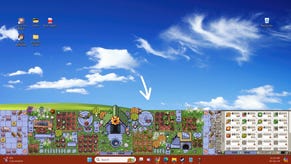Repetitive Strain: Tedium
We all like the art mods, right? Good - glad we’re in chin-stroking, beret-topped agreement. Earlier this week, Eddie Cameron got in touch to poke me in the direction of his new Half-Life 2 mod, Tedium, which I finally got round to playing yesterday. And, oh my, it is interesting.
Initially, it seems like an idea we’ve seen quite a few times before. You begin in a small, basic apartment, the glare of the sun shining through the windows. It’s stark and bare, and the only thing you can really do - other than have a nosey around in the bathroom - is leave your home and set about your somewhat mundane daily task.
It’s basically a more abstract version of something like Every Day The Same Dream. Your place of work is giant, skyscraping building with an enormous, architecturally mental lobby. But there’s nothing in it other than a lift up to a single higher floor. What’s all the excess space for? It’s never explained, which is kind of the point. Take the elevator up and you find yourself in a corridor, where all the doors are painted on except for one, which leads to your place of work. Your job? Collect small, glowing letters, and place them into their correspondingly coloured tubes.
Do this a few times and the letters stop appearing, leaving you with nothing to do but to head back down to the lobby, out of the door, and back to your apartment. It’s night time now, but you’ve barely a chance to get settled before your alarm’s going off, it’s morning, and the mod loops, sending you back to the start. Repeat ad infinitum. And every day, with every letter you correctly deposit, the score counter in the top right climbs higher. Towards what? Who knows. A hundred points of commission for every letter. Keep on sorting.
Tedium is not particularly pretty (although again, that seems almost to be the point), and nor is it enormously original. Other games have played around with this sort of mundanity, highlighting the daily grind of a boring office job - although usually taking a more literal route than the sorting of glowing As, Bs and Cs - but I found Tedium’s interpretation of the theme to be particularly intriguing. If you think this sounds like your sort of thing, I suggest you might want to go play it now (you’ll need HL2 and Source SDK Base 2007), then continue reading. (Spoilers follow, obviously.)

I’m interested to know how long it took you to figure out the trick. For me, rather embarrassingly, it took five in-game days. I’m not sure whether that says more about how conditioned we are by gaming convention, or about how slowly my mind clunks away sometimes. Either way, it wasn’t until day five that I finally managed to break the game.
I think there are a few reasons for this. Firstly, I was primarily interested in seeing whether something would happen. Obviously the game was looping, but was there a limit to this? If I ploughed away for long enough, would there be some sort of reward? Was this a game about waiting patiently for a pay-out, or one about being inexorably gripped by routine? That seemed to be the main question the mod was posing, so it was the one I ran with. It’s called Tedium, after all. The assumption was that it was testing my patience.
Secondly, games which ask us to break the rules tend to be pretty explicit about what those rules are. Consider something like The Path. The only way to beat that game is to disobey what it’s asking you to do, but to ensure that’s clear enough, it pastes that rule over the screen in huge glowing letters the second you press play. Here, you’re left to establish things for yourself. I’m not sure if it was intentional or not, given that you’re told that Mouse 1 is your default use key when you get to the letter-sorting stage, but it took me a while to even figure out how to open my apartment door. When you learn by doing, there’s a tendency to place more trust in those rules than when someone explicitly plonks them in front of you.
But most interesting of all is that I did try to break the game before day five, and assumed nothing was happening. Because I’d forgotten about the score.
It’s just there, in the top right. When I noticed it climbing with every letter I filed away, edging increasingly upwards into a void of numerical nothingness, my reaction was to think, “Hey, that’s quite a smart idea,” then not bother glancing at it again. So when I first tried to lob the wrong letter into the wrong tube, I didn’t bother to check what had happened to my score. I heard the buzz, but nothing else seemed to be going on. Oh well, I thought. Back to playing the game properly. It was, of course, the key to the entire thing.
I’m not sure whether any of these elements were fully intentional, or whether others would go through the same thought processes as I did. But for me, these cognitive tricks are what make Tedium stand out above the other games and mods that try to play with us in similar ways. And, of course, the ending is creative and lovely, going against the bland grain of what came before to close on a genuinely pretty scene. I like this a lot - not so much for what it says, but for how it goes about saying it.
